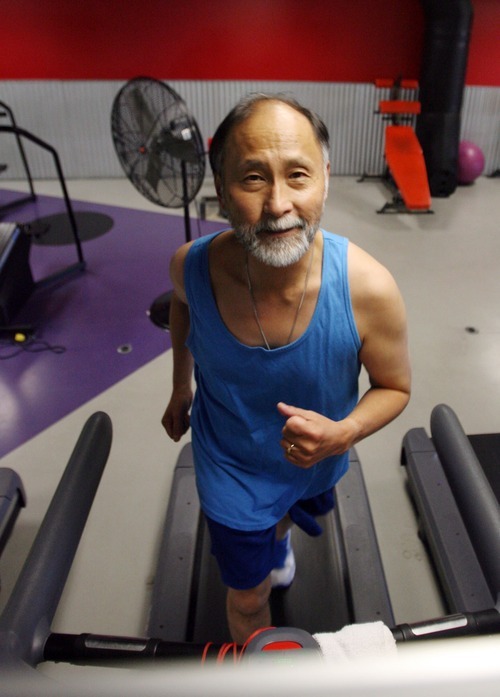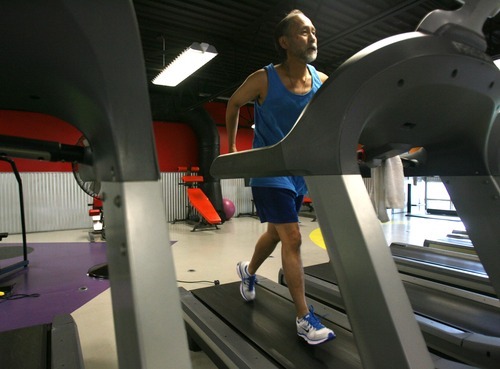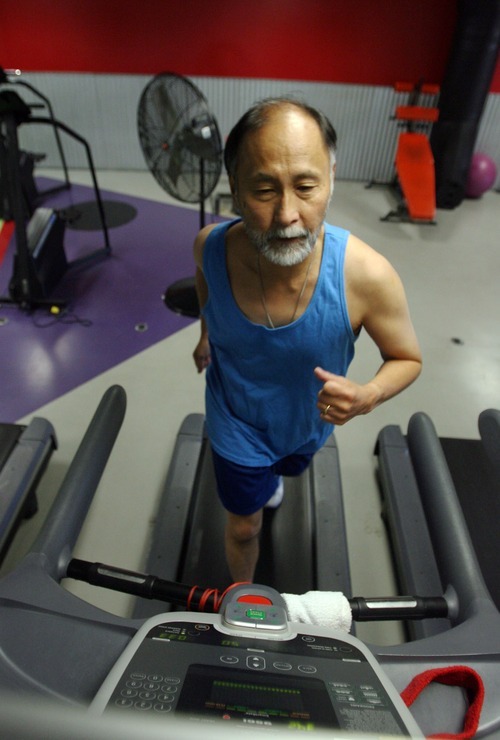This is an archived article that was published on sltrib.com in 2011, and information in the article may be outdated. It is provided only for personal research purposes and may not be reprinted.
The church potluck is due for an overhaul.
It's time to cut the fat out of funeral potatoes and shrink the slices of cake — all in the name of God.
Church pews are Utah's newest battleground to push back against potbellies, starting with the Episcopal Diocese of Utah.
With 5,000 members in 25 congregations, it is the first religious organization to formally agree to work with the state and others to prevent obesity among its members.
To Episcopal Bishop Scott Hayashi, emphasizing health is a natural fit for a diocese that established Utah's first hospital (St. Mark's) and for a faith that considers the human body a "temple of the Holy Spirit."
"From the beginning of the diocese of Utah, we have been a people who have worked together with God and with each other to save lives," he said recently, noting that the church also supports food pantries, domestic-violence shelters and 12-step programs. "Obesity is one of the ways in which human lives are put in jeopardy."
Hayashi said he will ask members to be healthy — to make healthy food for potlucks, choose smaller plates at coffee hours, offer apple slices and other fruit instead of cookies, grow gardens. And to be active.
"We need to be the healthiest, best people that we can be because that gives God glory," he said. "It gives God glory because we are taking care of God's creation."
The fit and faithful
Two out of three Utah adults and one of five children and teens are overweight or obese.
Leon Hammond, executive director of the Utah Partnership for Healthy Weight, said obesity is more than a health problem. It's the second leading cause of preventable death and is linked to Type 2 diabetes, coronary heart disease, stroke and osteoarthritis. It's also an economic and national security issue. Health-care claims are higher for obese individuals, and more than a quarter of young adults are too fat to join the military.
To prevent obesity, the partnership and the Utah Department of Health are asking various groups to change their policies and environments to encourage healthful eating and physical activity. Examples include adding gyms at work sites, nonfood rewards at schools and zoning restrictions on fast-food restaurants.
As an Episcopalian, Hammond chose his church as the state's first faith partnership. But having sampled his share of funeral potatoes, he said all faith communities can and should participate.
"One of the great ecumenical constants of life in Utah and America is that the church potluck meal tends to be one the most nutritionally toxic that you will encounter," he said. "I can assure you if you want to combat obesity in Utah, one of the battle grounds is the faith community potluck meal."
Other states also have turned to faith groups. Georgia created a manual that suggests monthly themes — eat dinner together, TV-turnoff week, diabetes prevention — including family activities, bulletin-board ideas and talking points for leaders.
"We were meant to live out our appointed time to an appointed purpose — but dying early of heart disease can prevent us from fulfilling our purpose," reads one talking point.
Utah's efforts are just starting, but seem natural to Hammond. At one point, churches, including Episcopalian, Roman Catholic and the state's predominant faith, the LDS Church, owned the majority of the hospitals.
They had taken the lead in diagnosing and treating diseases. Now it's time for faith communities to start preventing them, he said, and they have justification in their traditions to do so. Think of the Roman Catholic Church's admonishment against gluttony or the LDS Church's Word of Wisdom health code.
"Church has a lot to do with the culture of an area," agreed Lynda Blades, manager of the state Health Department's Physical Activity, Nutrition and Obesity program. "A lot of what we're trying to do is change the cultural norm and make a healthy lifestyle and healthy choices part of what's normal in a community."
Mormonism weighs in
Hoping the LDS Church will join their efforts, Blades points to the Word of Wisdom for support. Abstaining from tobacco and alcohol are well-known tenants, but the church's "law of health" also promotes eating grains, fruits and vegetables and limiting meat.
Other Mormon traditions, however, could use a makeover.
"You've got the cheesy potatoes, the Jell-Ocq and things like that that are typical," Blades said, "but it might be good to start exploring alternatives that might be healthier."
The LDS Church's Family Home Evening could become a physically active evening, Hammond noted.
The church doesn't expect to join the partnership, saying it wouldn't be possible to vet it or the hundreds of other programs seeking its support. But that doesn't mean wards or stakes couldn't join.
"The church applauds efforts that encourage people to be healthy and physically fit," LDS Church spokesman Scott Trotter said. "Our church leaders have consistently taught the importance of diet, including moderation in the consumption of food and drink."
The LDS Church has already opened the doors of its Spanish-speaking wards to the American Heart Association's Conozca Su Corazón, or Know Your Heart program. The three-hour class teaches Latinos about cardiovascular disease and stroke risk factors and how to prevent disease through exercise and diet.
"Since it coincides with their code of health, they've been willing to give us access to all of the Spanish-speaking congregations, which is more than 100," said Victor Arredondo, the association's program coordinator.
The association offered the classes in community centers in the past, but it was difficult to attract people. Since April, three-quarters of the 300 people who have taken the classes have come from churches, including 11 Mormon wards and an Adventist congregation. Early results show participants are eating more fruits and vegetables and exercising more.
He said offering the classes in a church lends credibility to the program.
"They're used to gathering there, they have social support there. ... If we're working with their congregation then it must be important."
Leading by example
At the Episcopal Diocese, Hayashi added a health page to the diocese website and stressed the importance of health at the diocese's annual convention last weekoct. 14-15.
He said the emphasis on being healthy shouldn't shock members: When he applied for the job to become bishop, he said he would want to take care of his body so he could tend to the flock's spiritual needs.
The 57-year-old is training for his first marathon, and he still wears a suit he bought at ZCMI more than two decades ago.
"I need to be in the best shape I can be in order to do the work," he said, adding that church members should strive to be physically healthy so they can stay emotionally and spiritually strong.
"I do believe we are called as people made in the image of God to reflect that image as much as possible in the ways in which we live, work and play," he said. "[St.] Irenaeus made the statement many years ago that 'the glory of God is the human person fully alive.' I would be asking our people to live intocq that."
How religions view health
Baha'i: • "All healing comes from God."
Buddhism • "To keep the body in good health is a duty … otherwise we shall not be able to keep our mind strong and clear."
Christianity • "The prayer of faith shall heal the sick, and the Lord shall raise him up."
Confucianism • "High mysterious heaven hath fullest power to heal and bind."
Hinduism • "Enricher, Healer of disease, be a good friend to us!"
Islam • "The Lord of the worlds created me … and when I am sick, he healeth me."
Jainism • "All living beings owe their present state of health to their own Karma."
Judaism • "O Lord, my God, I cried to thee for help and you has healed me."
Mormonism • "All saints who remember to keep and do these sayings [Word of Wisdom], ... shall receive health in their navel and marrow to their bones;
"And shall find wisdom and great treasures of knowledge, even hidden treasures;
"And shall run and not be weary, and shall walk and not faint;
"And I, the Lord, give unto them a promise, that the destroying angel shall pass by them, as the children of Israel, and not slay them."
Shinto • "Foster a spirit that regards both good and evil as blessings, and the body spontaneously becomes healthy."
Sikhism • "God is creator of all, the remover of sickness, the giver of health."
Taoism • "Pursue a middle course. Thus will you keep a healthy body and a healthy mind."
Zoroastrianism • "Love endows the sick body of man with firmness and health."
Sources: The book "Sacred Healing: The Curing Power of Energy and Spirituality" as quoted in Georgia's "Live Healthy in Faith: A Faith Community Guide to Promoting Nutrition and Physical Activity" and LDS.org







